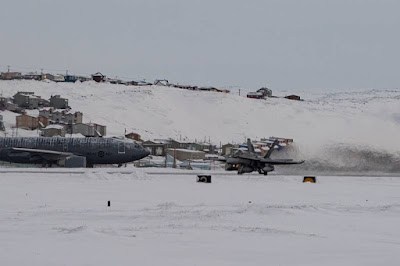Royal Canadian Air Force conducts fighter training in High Arctic
 |
| RCAF Hornets conduct training in High Arctic. |
From January 18 to 20, 2021, as part of the Canadian Armed Forces’ ongoing commitment to an enduring presence in the furthest reaches of the Arctic, the Royal Canadian Air Force (RCAF) conducted High Arctic air training involving two CF-18 Hornet fighters and one CC-150T Polaris air-to-air refueling aircraft operating from Iqaluit, Nunavut.
The training saw CF-18 fighter jets from Bagotville, Quebec rendezvous with a CC-150T Polaris air-to-air refueler over Baffin Bay where they successfully conducted air-to-air refueling before continuing North for the remainder of the mission conducting an Arctic patrol up the North-East side of Baffin Island, in the vicinity of Nanisivik, Nunavut.
Training like this demonstrates the RCAF’s ability to operate in the High Arctic. It enhances the RCAF’s ongoing support to operations and exercises, and showcases the Canadian Armed Forces’ ability to project force into the region so that we can work cooperatively with our partners.
“The Arctic is a fundamental part of Canada and this type of training strengthens situational awareness and information sharing with our Arctic partners and Allies while enhancing our agility and reach into Canada's northernmost territories. This training ensures the RCAF remains strong at home, in line with Canada’s Defence Policy: Strong, Secure, Engaged,” Major-General Eric Kenny, Commander, 1 Canadian Air Division said.
The training saw CF-18 fighter jets from Bagotville, Quebec rendezvous with a CC-150T Polaris air-to-air refueler over Baffin Bay where they successfully conducted air-to-air refueling before continuing North for the remainder of the mission conducting an Arctic patrol up the North-East side of Baffin Island, in the vicinity of Nanisivik, Nunavut.
Training like this demonstrates the RCAF’s ability to operate in the High Arctic. It enhances the RCAF’s ongoing support to operations and exercises, and showcases the Canadian Armed Forces’ ability to project force into the region so that we can work cooperatively with our partners.
“The Arctic is a fundamental part of Canada and this type of training strengthens situational awareness and information sharing with our Arctic partners and Allies while enhancing our agility and reach into Canada's northernmost territories. This training ensures the RCAF remains strong at home, in line with Canada’s Defence Policy: Strong, Secure, Engaged,” Major-General Eric Kenny, Commander, 1 Canadian Air Division said.
Source, Images: RCAF







No comments
All comments related to the contents of our articles are welcome. It is not allowed to post promotional messages, links to external sites, or references to activities not related to this blog.